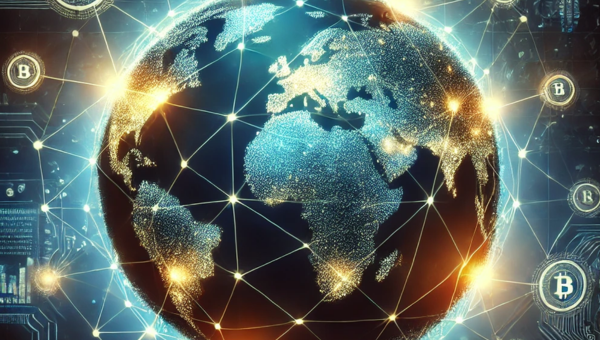Amid successive global economic crises, the world is searching for new and innovative solutions to overcome stagnation and promote development. Here, the decentralized digital economy emerges as a promising idea that not only aims to improve the economic situation but also seeks to completely change the rules of the game. This concept, based on modern technology, especially blockchain technology, offers vast opportunities to restructure economies and achieve greater fairness in resource distribution.
.png)
What is the Decentralized Digital Economy?
The decentralized digital economy refers to an economic system that relies on digital platforms operating without centralized intermediaries. This is achieved through technologies such as blockchain and digital currencies (like Bitcoin and Ethereum), which enable the direct exchange of value and services between individuals while maintaining transparency and security.
This model reduces the control of traditional financial institutions and central banks over economic operations, granting individuals greater freedom and the ability to manage their financial resources independently.
Why the Decentralized Digital Economy?
- Flexibility in Facing Crises: With the increasing global economic crises, such as inflation and rising unemployment rates, the decentralized digital economy provides a stable economic environment that is not tied to traditional institutions that may suffer from corruption or mismanagement.
- Elimination of Intermediaries: Relying on decentralized platforms reduces the costs associated with financial intermediaries, such as banks and payment companies, thus enhancing the efficiency of financial operations.
- Empowering Individuals: This system allows individuals to access diverse financial services regardless of their location or economic status. Anyone with a smartphone and a digital wallet can become part of the decentralized digital economy.
- Enhancing Transparency: Blockchain technology records all transactions in an immutable way, preventing manipulation or corruption and increasing trust among various parties.
Practical Applications of the Decentralized Digital Economy
- Digital Currencies: Cryptocurrencies like Bitcoin have become a popular medium of exchange, especially in countries suffering from instability in their local currencies.
- Decentralized Finance (DeFi): DeFi allows individuals to invest, borrow, or save without the need for a traditional bank or financial institution.
- Smart Contracts: Smart contracts automate processes between different parties, reducing the need for lawyers or third parties.
- Decentralized Work Platforms: Platforms like Ethereum and Cardano facilitate the development of decentralized applications and services that contribute to economic growth.
Challenges of the Decentralized Digital Economy
Despite its many benefits, the decentralized digital economy faces challenges, including:
- Regulation and Laws: Some governments hesitate to adopt this system due to the difficulty in controlling it.
- Cybersecurity: Although blockchain is secure, decentralized platforms may still be vulnerable to hacking.
- Digital Divide: Not everyone has access to the internet or smart devices, limiting the inclusivity of the system.
The Decentralized Economy and the Future of the World
In light of the current poor economic situation, the decentralized digital economy could be a savior for many individuals and countries. This idea is not just a distant dream but a reality that many people around the world are already experiencing.
If developed correctly, the decentralized digital economy could change the way we think about money, work, and trust. With the rise of technological innovation, this system may become the dominant economic model in the near future.
Political and Social Challenges of the Decentralized Digital Economy
Despite the many benefits of the decentralized digital economy, its widespread implementation faces several social and political challenges.
- Government Resistance: Many governments worldwide fear the impact of decentralization on the traditional financial system. This could lead to strict laws on cryptocurrencies and decentralized platforms, especially in countries facing economic crises or corruption.
- Concerns Over Funding Illegal Activities: Some stakeholders worry that cryptocurrencies could be used to fund illegal activities, such as terrorism or money laundering, increasing pressure on governments to regulate this field more strictly.
- Social Transformation: Decentralized digital economies could lead to significant social changes, as the need for certain traditional jobs, such as those in banks or financial intermediaries, may diminish. This transformation could pose challenges in the labor market in some sectors.
